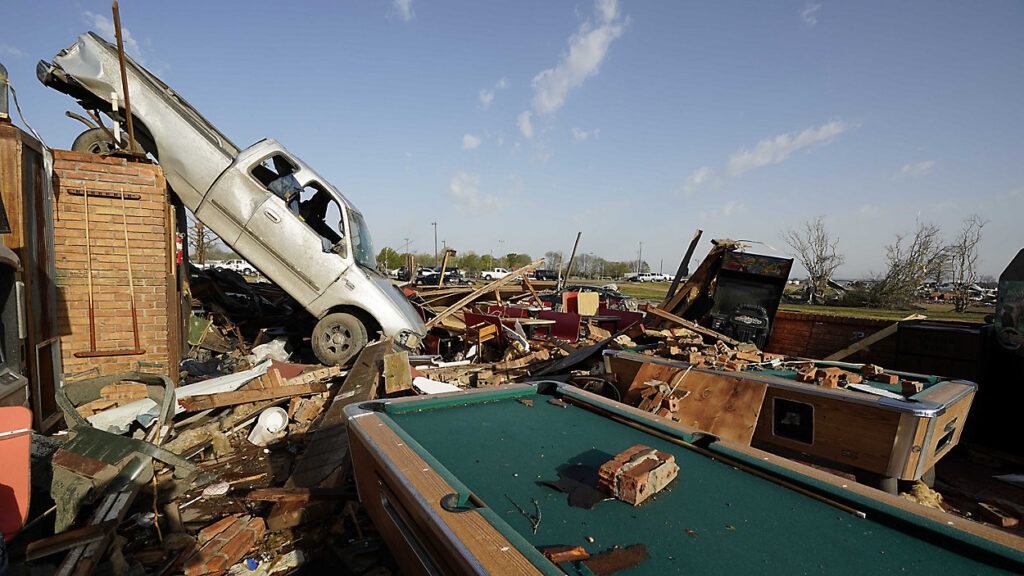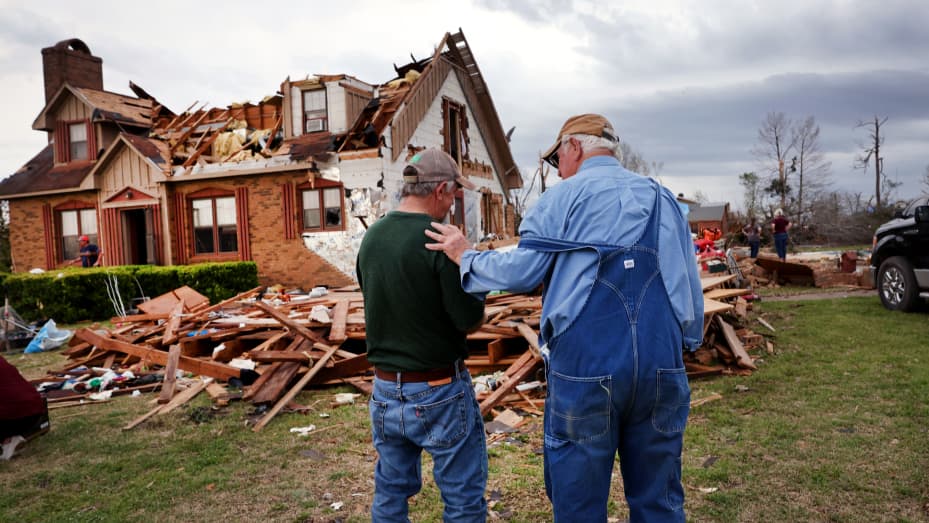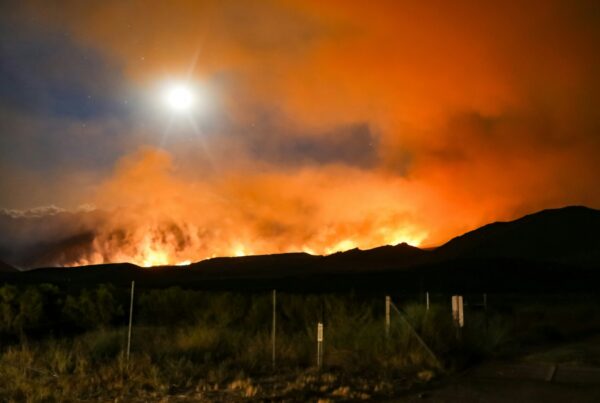The devastation was simply too much to bear. In a race to beat the EF-4 tornado bearing down on the small community of Rolling Fork, Mississippi, two weeks ago, Queen’terica Jones and her sister ripped across the sprawling Delta to reach their mother’s home. Reported by the Associated Press, as they got closer to town the wind became so powerful it lifted the car’s rear off the ground and slammed them into a nearby churchyard.
They got to the house too late – their mother was dead, her home destroyed, and the town of Rolling Fork leveled by three-second wind gusts of 166-200 miles per hour. With no electricity following the horror that lasted more than an hour, survivors’ only source of illumination to search for family, friends, and neighbors were cell phone flashlights to poke and prod through the wreckage.
The sisters’ mother’s name was Erica Jones, and she worked as a personal care assistant. Survived by six children, she was a “beautiful soul” who loved to pray and help others any way she could. “She was amazing, a sweetheart,” her daughter said. “Everybody that’s known my mom knows she had a heart of gold.”
At least 21 people in Mississippi and a man in Alabama lost their lives as looming tornadoes tore through the Deep South this weekend. The death toll was particularly heavy in western Mississippi’s Sharkey County, population 3,700, where Moore was among 13 people who died, with dozens injured.
With a town population of just over 2,000, the close-knit community is taking the losses hard.
“I had to identify family, that’s what it felt like,” said Sharkey County Coroner Angelia Eason. “When something like this happens, we tend to come together even closer. We didn’t just lose 13 people. We lost 13 family members.”
Tornado deals disastrous hand to low-income communities
Days following the violent devastation of one of the poorest regions in the United States, residents and authorities began the difficult process of evaluating the damage. Considering the grief those communities are already experiencing, one cannot help but imagine how difficult the prospect of getting prepared for disaster events can be for low-income communities and their individual residents in the first place.
On Sunday, President Joe Biden issued an emergency declaration for the entire state, allocating funds for the hardest hit areas like Rolling Fork. For such small, low-income communities, however, rebuilding may be problematic. According to Census data, approximately 21 percent of the town’s residents, the majority of which are Black, live below the poverty line, contrasted with the national average of roughly 13 percent. About 41 percent of residents in Rolling Fork receive Supplemental Nutrition Assistance Program (SNAP) benefits.
The Federal Emergency Management Agency (FEMA) reported Monday that over 300 structures including homes and businesses were destroyed along with a fire station that was totally flattened. More than 1,600 homes were damaged or destroyed by the storm, leaving hundreds of low-income individuals and families looking for temporary shelter locations.
And when we say low-income communities, we do not mean it as a euphemism. Sharkey County has a 35 percent poverty rate, higher than the state of Mississippi’s 19 percent, and the national average of less than 12 percent, according to the Census. More than half of Mississippi residents have fewer than $1,000 in savings and roughly 38 percent don’t have any savings at all, the State Treasury of Mississippi reports.
Poverty itself can impact an individual’s access to cell phones or other digital communication technologies. Municipalities and state governments must create a culture of optimal preparedness, especially when it comes to communication resources in regions like Sharkey County where the ring of “but the local economics don’t allow you to afford that” is overwhelmingly loud, as confirmed by Tanya Gulliver-Garcia, director of learning and partnerships at the Center for Disaster Philanthropy.
Multiple studies have found people in poverty, with low incomes and with less education, are less prepared for disasters. In fact, nearly two-thirds of American households don’t have adequate plans and supplies for a destructive event, according to the National Center for Disaster Preparedness at Columbia University.
According to FEMA Emergency Manager Deanne Criswell, cell phones or other mobile devices are powerful life-saving preparedness tools for warning residents prior to an emergency event. At the same time, Criswell told ABC News, confirming that people of all economic backgrounds have the mobile capability to be reached “is something we have to continually look at what we can do better to inform people. We need to really talk to these families and find out how they would have better gotten this message because we always have to work on giving people early warnings.”
Particular attention must be paid in states and counties like Mississippi and Sharkey County, especially, which now experience upwards of 30 to 100 tornadoes every year. From protection to transportation prior to and after the storm, Gulliver-Garcia says that access to both plays a major part in the entire system working efficiently. To the point, it may surprise that the closest tornado shelter to Rolling Fork is in Mayersville – 17 long miles away.
“A number of people didn’t have cars or cars that were properly working and got destroyed,” says Gulliver-Garcia. “Because they’re small towns, they also don’t have a public transit system. Even the ability to access any kind of support – to go to a disaster recovery center, get to a shelter, to a feeding program – those are all challenges.”

Between a rock and a hard place
The frustration lies with the individuals and families who live paycheck-to-paycheck and experience significant difficulty in saving and preparing for a calamity – but also the financial security to recover.
“Your home is destroyed and the place where you lived is no longer accessible to you,” continued Gulliver-Garcia. “And then if you’re working paycheck-to-paycheck or working a job that was destroyed – If you’re not allowed back into the community right away, you’re not even getting that paycheck-to-paycheck anymore. That’s gone as well.”
With tens of thousands in probable home and business repair, not to mention recovery costs, rebuilding in any respect can easily snowball into massive, compounding debt. That’s why credit unions are central casting for a healthy, disaster-prepared county like Sharkey County, Mississippi.
Upon hearing of an impending tornado, hurricane, or wildfire, community residents know they can access a QCash mobile Financial First Responder Loan from your credit union app. In one minute – usually less – following a very brief application, if approved your members will receive their loan deposit in their account. Nearly instantaneously, your members will receive the funding they need, right where they need it, to prepare for the coming life event.
This last week’s disaster in Mississippi is yet another reminder that as natural disasters continue to increase, accelerate, and intensify – stronger hurricanes, larger tornadoes, drier wildfires – your credit union has the capability to bring instant financial relief to low-income communities across the nation, be it everyday financial inclusion efforts or disaster relief and infrastructure resources.
Upcoming WEBINAR: CUNA and QCash to discuss disaster prep
QCash is excited to partner with CUNA Strategic Services for our webinar “Be Your Members’ Financial First Responder: Preparation Is Key.” The webinar on April 18 at 12:00 MT will discuss the importance and accessibility of the credit union movement to those members at risk of experiencing potential disasters in their communities.
Sign up to watch as QCash’s Seth Brickman and a CSS representative discuss the contemporary financial technology tools and the urgent necessity in providing members affordable access to funds in case of an extreme weather event.
When a hurricane, tornado, or wildfire strikes, your credit union has to be ready to help your members at the click of a finger. When threats find their way to our nation’s communities, it will take needed funds to prepare to evacuate, particularly in lower-income communities and neighborhoods. Credit unions need to be ready to respond to their members’ life events, calendar-based needs, and disasters in their localities.
Join us for this impactful webinar hosted by CUNA Strategic Services and QCash Financial!
*If you wish to contribute to Mississippi disaster relief efforts, the Mississippi Emergency Management Agency (MSEMA) has a list of locations receiving donations of household items and clothing.






